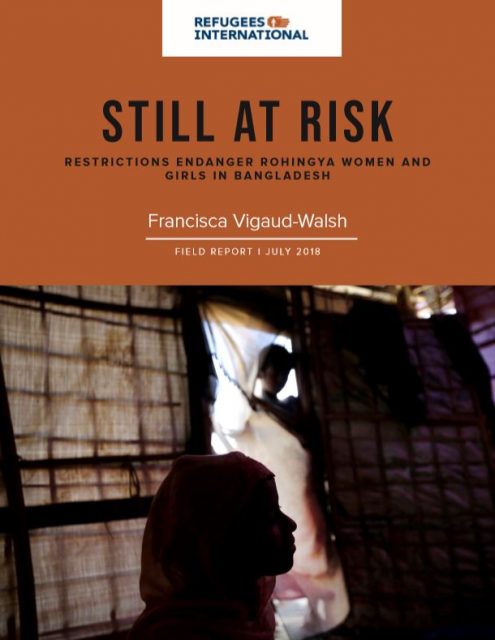Still At Risk: Restrictions Endanger Rohingya Women and Girls in Bangladesh
25 July 2018


The Rohingya minority in Rakhine state, Myanmar, has undergone a brutal campaign of ethnic cleansing marked by widespread sexual violence. As extensively documented by the United Nations and by media and human rights groups, Myanmar’s security forces systematically rounded up and sexually abused Rohingya women and girls. Rohingya women were set on fire, mutilated, gang raped, and forcibly detained and raped in military camps for weeks at a time. Since August 2017, over 700,000 Rohingya have fled these and other state-sanctioned atrocities to neighboring Bangladesh.
Yet despite the acute awareness of the use of sexual violence as a weapon against the Rohingya, the humanitarian community in Bangladesh was—and remains—ill-prepared to prioritize gender-based violence (GBV) as a lifesaving matter in its response. The scale of violence experienced by Rohingya women both before and during their flight from Myanmar required a mass deployment of GBV and sexual and reproductive health (SRH) capacity and services. However, the availability of quality GBV and SRH services remains grossly inadequate even months into the response.
Further, though Rohingya women in Bangladesh are currently safe from the violence in Myanmar, GBV continues in refuge, with hundreds of incidents reported weekly. Funding and programs to support survivors were established, but efforts to take them to scale have led to serious quality concerns. These include concerns over unqualified practitioners, a failure to respect basic GBV programming principles, and limited promulgation of options for different courses of care and treatment (referral pathways). In addition, the international humanitarian response suffers from blurred lines of accountability and oversight. This has further undercut the effectiveness of GBV programming.
Some of the shortcomings in the GBV response are the result of a wider set of challenges emanating from the scale and rapid onset of the emergency, land availability, and coordination difficulties between the Government of Bangladesh and the UN system. But most important, the Government of Bangladesh imposes stringent restrictions on humanitarian actors and refugees that have severely undercut efforts to meet the needs of Rohingya women and girls. A comprehensive, professional, and accountable multisectoral response to GBV is long overdue.
In April 2018, Refugees International (RI) conducted a mission to Bangladesh, to research the GBV response for Rohingya women and girls. RI found that the entire humanitarian system is struggling under tremendous constraints in Bangladesh, and protection and health actors do deliver lifesaving services to survivors in an incredibly challenging environment. This report, however, focuses on key gaps and challenges in GBV programming, as communicated by practitioners deployed to Bangladesh at various stages of the emergency, by local organizations, and by the affected women and girls themselves.
In the analyses and recommendations provided in this report, RI draws in part from the framework of the international initiative to safeguard women and girls in emergencies—the Call to Action on Protection from Gender-Based Violence in Emergencies—and urges the donors and humanitarian organizations that are Call to Action partners to implement it more effectively and with urgency during this emergency.
Download full report HERE.
၎
င
၎
၎
Announcements
28 February 2025
Asian NGO Network on National Human Rights Institutions , CSO Working Group on Independent National Human Rights Institution (Burma/Myanmar)
Open letter: Removal of the membership of the dis-accredited Myanmar National Human Rights Commission from the Southeast Asia National Human Rights Institution Forum

Progressive Voice is a participatory rights-based policy research and advocacy organization rooted in civil society, that maintains strong networks and relationships with grassroots organizations and community-based organizations throughout Myanmar. It acts as a bridge to the international community and international policymakers by amplifying voices from the ground, and advocating for a rights-based policy narrative.